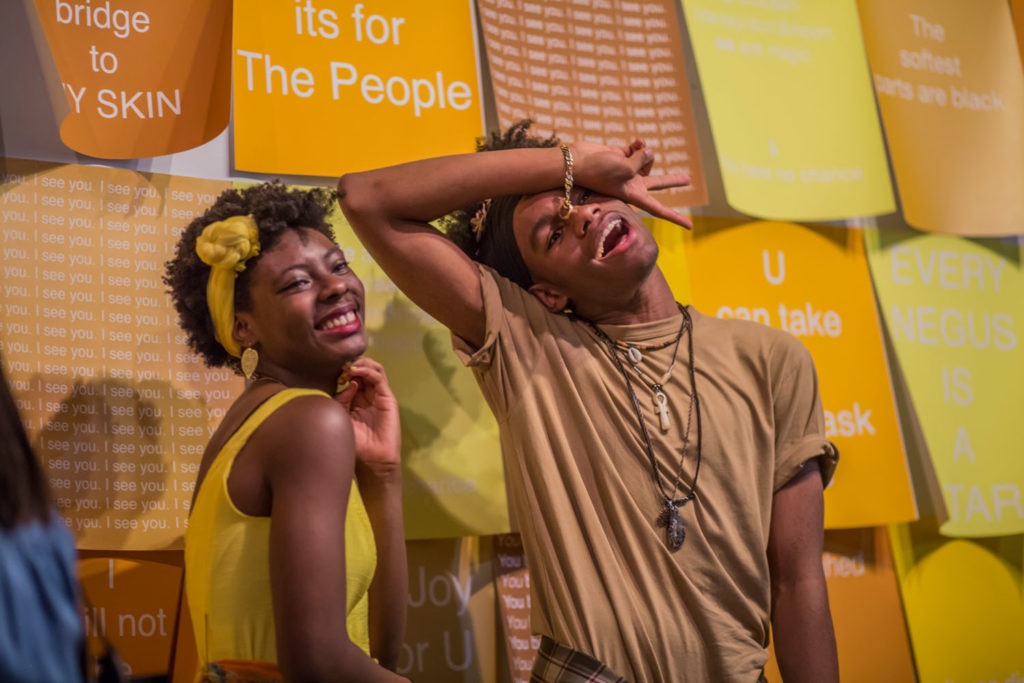About the AMC

The Allied Media Conference emerges out of 20 years of relationship-building across issues, identities, organizing practices and creative mediums. Since the first conference (then the Midwest Zine Conference) in 1999, people have been compelled by the concept of do-it-yourself media. The zine conference was rebranded as the “Underground Publishing Conference” for a couple years and then became the Allied Media Conference in 2002. The shift to Allied Media attracted more people who were interested in using participatory media as a strategy for social justice organizing.
Allied Media Projects and the AMC moved from its home in Bowling Green, OH to Detroit in 2007. The move facilitated more young people, queer people, people of color and low-income communities to participate in the conference. More artists and organizers from Detroit were participating, and people from other places were excited to learn from Detroit’s legacy as a Black Power and Labor Movement city. Detroit offered many examples of visionary organizing models emerging in the midst of post-industrial crisis; at the same time, out-of-town visitors to the AMC brought with them skills and experiences from their home communities that were valuable to Detroiters.
BRIEF TIMELINE OF THE AMC 1999-2019
- 1999: Allied Media Conference founded as the “Midwest Zine Conference” in Bowling Green, Ohio.
- 2002: The conference is renamed the “Allied Media Conference” (AMC) and Allied Media Projects is founded as the umbrella organization that coordinates the AMC.
- 2007: The AMC moves to Detroit.
- 2008: The AMC begins using “Tracks” to organize sessions that focus on a specific theme.
- 2009: The AMC surpasses 1000 attendees.
- 2012: “Practice Spaces” and “Network Gatherings” are introduced as new ways for attendees to engage at the conference.
- 2015: The AMC surpasses 2,500 attendees – our largest attendance number to date. “AMC @ Night,” a five-day music festival during the AMC, showcases local and national musical talent.
- 2016: The tenth anniversary of the AMC moving to Detroit!
- 2018: The AMC celebrates its 20th anniversary!
- 2019: The AMC takes a Year in Chrysalis
- 2020: AMC returns!
WHAT WE DO AT THE AMC
The Allied Media Conference is a collaboratively designed event that explores the intersections of media and communications, art, technology, education, and social justice.
The glue that holds these incredibly diverse content areas together is “media for liberation,” or any collaborative process that uses media, art or technology to address the roots of problems and advance holistic solutions towards a more just and creative world. Another central theme is “visionary organizing,” where folks are not only resisting current systems but modeling new liberatory ways of being.
WHO ATTENDS?
Participation in the AMC has grown from 600 people at the first AMC in Detroit in 2007, to over 3,500 participants in 2018, our biggest audience to date. In 2018, 58% of attendees were first timers, more than any previous year. 31% of participants come from Detroit. AMC attendees come from 224 different cities and towns all over North America, and internationally from countries such as Mexico, Germany, Brazil, and the UK. From artists to organizers, technologists to entrepreneurs, the AMC convenes individuals representing a wide range of fields and backgrounds.
AMC participants are incredibly diverse. In 2018, 57% of participants identified as a person of color and 50% as LGBTQ. 26% of AMCers are under 25 years old.
NETWORK BUILDING BEYOND THE AMC
Since our move to Detroit in 2007, Allied Media Projects has supported media-based education and organizing efforts beyond the annual Allied Media Conference. From 2009 – 2013 we worked as part of the Detroit Digital Justice Coalition to implement a city-wide media arts and technology initiative called “Detroit Future” through which we trained hundreds of Detroit community leaders in media-based organizing skills.

In 2014 AMP launched the Sponsored Projects program which provides a range of supportive services to projects that align with our mission of cultivating media strategies for a more just, creative, and collaborative world. These sponsored projects constitute a network of “allied media projects” who are pooling resources to access, through AMP, vital back-end management resources in accounting, fundraising, and communications. For our network’s grassroots projects, working under the AMP umbrella helps relieve the burden of having to choose between becoming an independent 501c3 and being under-resourced.
The work of organizing the AMC changes constantly, and there is no perfect formula for how we do this work. But embedded into every conference organizing cycle are a set of principles, which AMP has distilled from our network after years of listening. These principles are also threaded throughout the growing network of Sponsored Projects that AMP supports year-round. Read the AMP Network Principles.